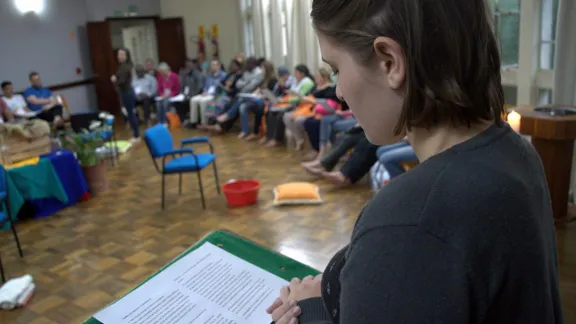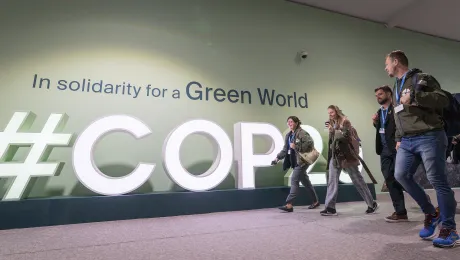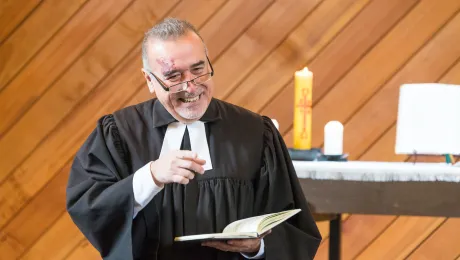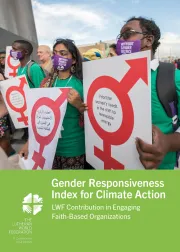
A participant offers insight at the LWF International Seminar on Prevention, Conflict Management and Peacebuilding. Photo: Scheila Dillenburg
“Churches have not been exempt from the impact of social polarization”
(LWI) - With the aim of equipping member churches to prevent or resolve conflict, the LWF International Seminar on Prevention, Conflict Management and Peacebuilding was held from September 17 to 21 in São Leopoldo, Brazil.
In joint work with the Sustainability Institute Latin America and the Caribbean (InS) of Faculdades EST university, São Leopoldo, the LWF Sustainability Program gave seminar participants tools to equip them to understand conflict, the human response to conflict, and to promote interactive ways of working with conflict. The LWF Sustainability Program is organized by LWF member churches in the university.
The seminar was a response to the growing reality of tension that has increased around the world, especially in recent years. "The churches have not been exempt from the impact of social polarization and, in some cases, the internal conflict has generated frustrations and led, in some churches, to unexpected and painful divisions," said Rev. Dr Patricia Cuyatti, LWF Area Secretary for Latin America and the Caribbean, who coordinated the seminar.
We planned this seminar as a space of empowerment for leaders who make use of the basic aspects of mediation in their contexts.
"We planned this seminar as a space of empowerment for leaders who make use of the basic aspects of mediation in their contexts - deeply articulated with the spirituality and theology that affirms that God's life can, collectively, promote the resolution of potential conflicts," Cuyatti said.
Understanding “what really happens” in conflict
The seminar focused on understanding conflict and its evolution. On this basis, the use of mapping techniques enabled participants to learn the role of mediation in a practical way. The methodology, Dialogue for Peaceful Change, sought to find the source of the conflict in order to promote peaceful change and restoration. Participants identified threats in their contexts and learnt to view tense relationships as opportunities to practice mediation and overcome prejudice.
Participants said it exceeded expectations. "I have learned a lot and I know it will help me because in El Salvador we have a lot of violence, especially with youth. I am grateful to have begun the exercise of being a mediator,” said Ever Vásquez Carrillo of the Salvadoran Lutheran Church. "If we are churches, we have to find these resources and practice using them. It will help me with my relationships in the family as well. I have had a rich experience while putting myself into the role of listening and of understanding what really happens during conflict,” said Georgina Arriagada of the Lutheran Church in Chile.
An objective of the seminar was that InS would become a hub for formation on issues of peace and develop a curriculum for training mediators. "Together with key InS people, a smaller group of leaders and leaders from the member churches in Latin America and the Caribbean and North America will be able to continue the training. The InS plays a central role here as a center for training and continuing education in mediation using participatory methodology and spirituality,” Cuyatti said.
Participants from 21 churches in Latin America and the Caribbean, North America, Africa, Asia and Europe took part in the seminar.
By LAC Communications Network


